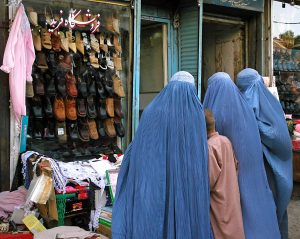When the Taliban announced on May 7 that women and girls should not leave their homes unless necessary and should do so only with their whole bodies including their faces covered, some people were surprised. Others were not.
Among the surprised: Some diplomats and other Afghanistan watchers who listened to Taliban leaders promise during negotiations and at their news conference two days after seizing the capital that they would respect all women’s rights this time, including their freedom of movement and access to employment and education.
And those who were not surprised: Afghan women who lived through the last period of Taliban rule from 1996 to 2001 and Afghan women’s rights activists.
Afghan women’s right activists warned all along that the Taliban’s promises to respect women’s rights were false. They warned in the days after the Taliban took the capital, Kabul, on August 15, 2021, that the group would intensify their crackdown on women. And that’s what happened.
The list of Taliban violations of the rights of women and girls is long and growing. The Taliban appointed an all-male cabinet. They abolished the Ministry of Women’s Affairs and replaced it with the Ministry of Vice and Virtue, which issued the most recent order. They banned secondary education for girls and banned women from almost all jobs. They blocked women from traveling long distances or leaving the country alone. They dismantled the system to protect women and girls from violence and made it difficult for them to get health care. They issued new rules for how women must dress and behave. They enforce these rules through violence.
Women – with extraordinary courage – took to the streets in protest. The Taliban beat, threatened, pepper sprayed, abducted, and detained them.
The latest order is a chilling escalation. Not only does it make every woman or girl who is outside her home a suspect, but it also strips women and girls of the shreds of autonomy they still had, the ability to resist. The order states that if a woman or girl disobeys, the punishment — including imprisonment — will be inflicted on her male guardian. In this way the Taliban coerce every man to become complicit in their abuse, each man the jailer of his female relatives.
What can be done? There are no easy answers. But neither is there any excuse for inaction.
Since the Taliban takeover there have been many statements condemning their abuses from an impressive range of international and regional organizations and countries. What there has not been, however, is a clear plan for how the countries condemning Taliban abuses will work together to defend the rights of Afghan women and girls and pressure the Taliban to end these abuses. The donors that were deeply involved in Afghanistan over the last 20 years have failed to even act effectively to end the financial crisis their departure created, which has left 95 percent of Afghans hungry.
But countries around the world can — and should — do more. There are things the Taliban want from the international community. At the top of that list are things like legitimacy, respect, and status, but also relief from sanctions and financial assistance.
As long as there are things the Taliban want, there is leverage. As broad a range of countries as possible should agree on a roadmap for making it clear to the Taliban that the only way they can move toward achieving their goals is through actions including massive reforms to human rights, which are inseparable from the rights of women and girls.
Six countries should lead this process. They are the countries that have pledged to have a feminist foreign policy: Canada, France, Germany, Mexico, Norway, and Sweden. The United States — which has led the international engagement in Afghanistan over the last 20 years — should encourage, welcome, and support these countries in doing so. What is happening right now in Afghanistan is the most serious women’s rights crisis in the world today, and the most serious women’s rights crisis since 1996, when the Taliban took over the last time. There is no time to lose.

































